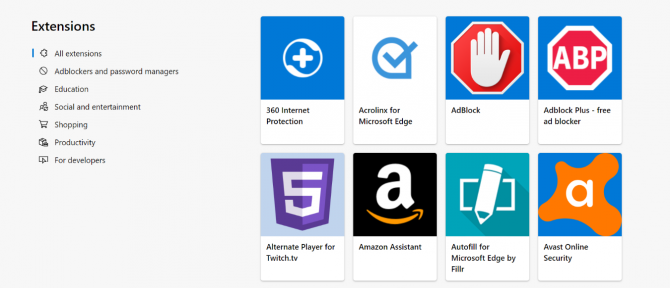Microsoft's New Edge Browser Extensions Could Make You Ditch Chrome
If you haven't heard yet, Microsoft is overhauling its Edge browser and rebuilding it on Chromium, the open-source rendering engine Google uses for Chrome. The company hasn't provided a timeline for when its Chromium-based Edge browser will debut, but newly-discovered extensions suggest the change is not far away.
An Edge Insider Add-on store housing 84 extensions was discovered by Twitter user WalkingCat. Included in this first group of extensions are AdBlock, Avast Online Security, Grammarly, Honey, LastPass and Pinterest Save Button. The store groups these tools into categories, which currently include Adblockers, Education, Social and entertainment, Shopping and Productivity.
Like on Chrome, users can press on these add-ons to get more information about them and install them on their browser. Windows Insiders will get first access to these tools, which will presumably be available on Edge when Microsoft launches its Chromium-based browser sometime this year.
Microsoft released Edge four years ago as a replacement to the aging Internet Explorer. The browser offered blazing fast performance and proved a compelling alternative to Chrome and Firefox. However, Edge never caught on mobile or desktop users as Chrome's market share continued to skyrocket.
One of the reasons Edge fell behind is because it lacks extensions. In its first year, Edge garnered only 70 add-ons from third-party developers compared to 180,000 available on the Chrome Web Store, ZDNet reports. Microsoft is hoping the switch to Chromium will encourage developers to code for Edge and tempt users away from Chrome, the most popular web browser across all platforms.
Microsoft says a preview build for the upcoming Chromium-based Edge will be available in early 2019 on Windows 7, Windows 8.1 and Windows 10. The company also intends on bringing the browser to macOS.
Sign up to receive The Snapshot, a free special dispatch from Laptop Mag, in your inbox.
Phillip Tracy is the assistant managing editor at Laptop Mag where he reviews laptops, phones and other gadgets while covering the latest industry news. After graduating with a journalism degree from the University of Texas at Austin, Phillip became a tech reporter at the Daily Dot. There, he wrote reviews for a range of gadgets and covered everything from social media trends to cybersecurity. Prior to that, he wrote for RCR Wireless News covering 5G and IoT. When he's not tinkering with devices, you can find Phillip playing video games, reading, traveling or watching soccer.


